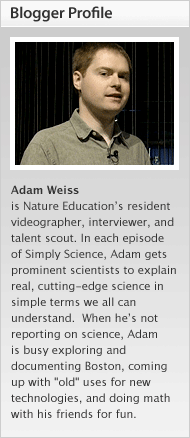« Prev Next »
In today's episode, Dr. David Pesetsky of the Department of Modern Languages and Linguistics at MIT talks to Adam about the similarities shared by all human languages. Despite differences in words and their arrangement into phrases and sentences, languages vary in systematic ways around the globe. Similarities between languages have led some researchers to speculate that something inherent in the human brain is biologically responsible for language; consequently, their research focuses on the language acquisition of children for clues. Advances in neuroscience and brain imaging may ultimately indicate the biolgical basis for language. Join Adam as he learns about the universal nature of language and how future research may finally reveal how the brain processes and supports human expression. [03:56]
In today's episode, Dr. Michael Wolfe of the Laboratory for Experimental Alzheimer Drugs at Harvard Medical School and Brigham & Women's Hospital talks to Adam about the biochemistry underlying Alzheimer's disease (AD). AD is a neurodegenerative disease associated with plaques and tangles in the brain formed by two proteins, amyloid β (Aβ) and tau, that damage and eventually destroy brain cells. Wolfe and his lab study the mechanism responsible for producing Aβ, which builds up over time and comes to negatively affect the parts of the brain essential for memory and cognition. As the brain ages, it becomes less able to clear out Aβ; as result, Wolfe asserts that the increase in life expectancy worldwide will lead to an exponential rise in cases of AD. Knowledge of the proteins responsible for the development of AD is leading to novel approaches to treating the disease, some of which have gone into clinical trals. Join Adam as he learns the biochemistry behind this growing disease as well as potential therapies to treating it. [04:34]
In today's episode, Dr. Aaron Baggish of the Massachusetts General Heart Center talks to Adam about studying the effects of exercise on the human heart. The sole function of the heart is to pump blood to body tissues such as muscles, supplying them with the oxygen and nutrients necessary to do their jobs. Like exercising any other muscle, working the heart harder and harder causes it to thicken, enlarge, and change how it functions. Whereas short, repetitive activities will thicken the heart's walls, extended endurance activities will widen its chambers. While the Heart Center's research focuses most prominently on the hearts of professional athletes, its findings will ultimately provide knowledge to all kinds of exercisers, ranging from professional to recreational. Join Adam as he learns the changes that exercise produces in the heart as well as what it takes to maintain a healthy heart. [05:31]
























